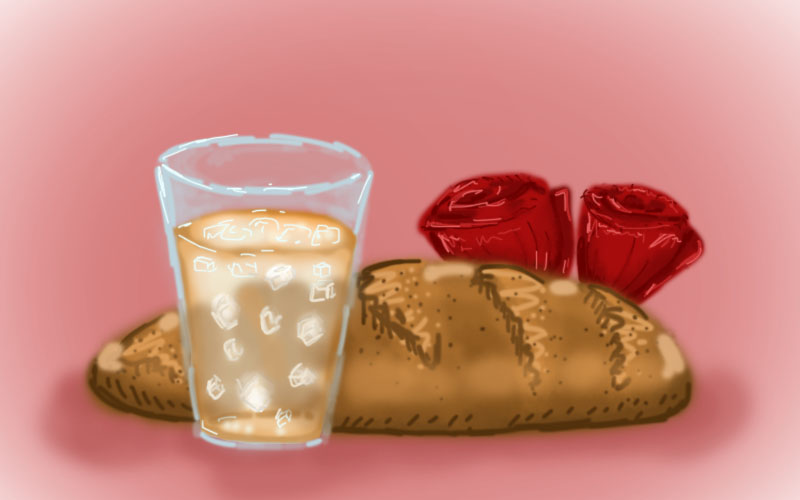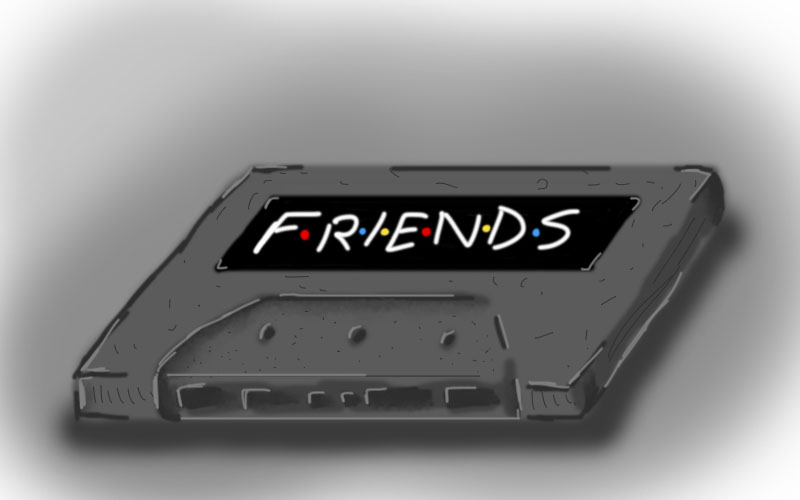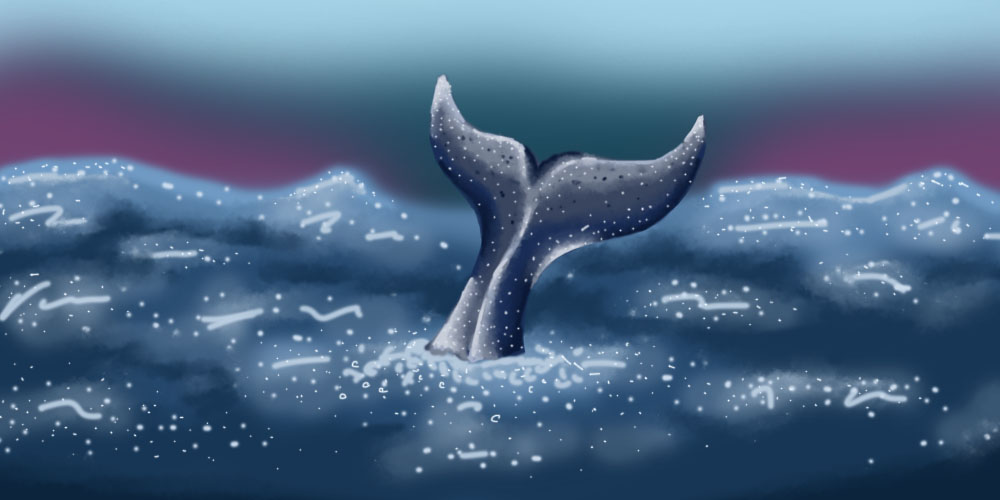On our cruise to Alaska, I can’t stop thinking about how the water remembers. I am with my mother, who turned 60 last month, because this is her sole bucket list item and because I’ve promised myself for over a decade that — despite her poverty and my current underemployment — I would make this trip possible. Bread and roses, I say over and over in my head, remembering the old labor slogan that is as relevant today as it was at the turn of the century. When labor leader Rose Schneiderman first exclaimed this phrase in a speech, she meant that the working class deserves more than just bread alone. That they, we, also deserve flowers, beautiful ones . . . Needs, yes, but pleasure too. For my mom, we need disability benefits, but also, yes, an Alaskan cruise. Bread and cruises, as it were.
The ship rides smoothly on the glacial runoff that provides refuge to orcas and other Alaskan sea life Mom desperately wants to spot. We are surrounded by the sea every morning and every night, and at one point I ask her, “Do you know that the water remembers? It has the best memory of anything else on earth, even the elephant. It can also hold sounds for hundreds of years.”
“What?” Mom asks and leans her ear close to my mouth. Her hearing is almost entirely gone, and because she got her hearing aids from the free clinic, they only work sometimes.
“I learned about it on a podcast,” I say, “that water has memory and it retains sound. So, like, the screams of enslaved people jumping from ships during the middle passage, the water still has that.”
She still can’t hear me and I give up trying to explain, but I can’t shake it, that we’re being carried by the sounds of so much that came before us.
Later, Mom and I sit down at dinner with my partner and my uncle who are also on the cruise. I focus on the upscale menu. I cannot actually afford this and neither can Mom.
I think about tiers of poverty. When I say, I cannot actually afford this, it means that I am dipping into savings I hoped I wouldn’t have to dip into until Mom was too old to work (and which I hoped was a day that was further in the future, given how minuscule the savings are, and how much of them belong to student debt collectors anyway). So I can’t afford it, but also I can, because the money exists, but it’s agonizing to spend given my lifelong and relentless lack of financial security. I lost my full-time job a year ago, joining the ranks of precariously employed PhDs and haven’t had a steady paycheck since.
When I say Mom can’t afford this either, I mean she is actually penniless. She used to have a stable, albeit low-paying job, but she lost it during the recession. And although the market somewhat recovered, she — as a 50-something-year-old woman without any degrees — didn’t. She lost her most recent service industry job — due to the physical inability to do the work —almost exactly a month ago, and that last paycheck went to food and gas for her car that has a side mirror held on by duct tape.
But here we are on this cruise, serving food with names I can’t pronounce, and I almost laugh out loud at how ridiculous it is to be here. Bread and roses, my astute partner will sometimes whisper to me when he sees me silently spiraling. After years of knowing me, he understands where my brain goes — to class, to how will we pay this bill, to what the fuck am I even doing here in this world I don’t belong? Tears burn my eyes, but I nod. Bread and roses.

I look at my mom, who seems more present at our meal, sipping her iceless water that she orders along with iced tea. While the rest of us drink wine, she, in an act of strength that I will never comprehend, maintains her nearly 30 years of sobriety. I was four years old when a car accident left her a single parent and four years old when she realized she couldn’t raise me if she was a drunk. I am deeply in awe of her for this, partly because life continued to throw things her way — an abusive boyfriend, the loss of jobs and homes, the deaths of her parents — that would have made so many others turn back to their vices. But she has, in all these years, never wavered.
Her iced tea arrives. She squeezes a bit of lemon into the glass, then, in her now-routine fashion, plops the wedge into her water.
I think of which water would most remember her: scalding-hot dirty dishwater in the kitchens of the restaurants where she’s worked; the rain she’d be soaked in on her 3 a.m. paper route which she endured 365 days a year for over a decade; the drained bathwater of the elders who she cared for during her stint as a home healthcare aide, and then again as the caretaker of her dying parents.
This is not to say she or my life was joyless; in fact, like most working-class people, we found ways to be happy despite all that was working against us. And for both of us, we still had some level of access, given that my grandparents were solidly middle-class. Some elements of my home life were as stereotypically “white trash” as you can get — NASCAR races on TV (with stolen cable), broken down cars in the unmowed front lawn, a rotating mix of house guests who were late on their rent or fleeing an abusive partner — but this was a dramatic contrast to our weekends with the grandparents where we saw live theater or visited the art museum.
Even travel was accessible sometimes. For Mom and I, this was mostly road trips that only cost a tank of gas — as Clevelanders, this meant Pittsburgh, Cincinnati, sometimes Toronto. We polished off cheap car snacks, played “20 Questions,” and sang along to our favorite albums — from John Denver to Barbara Streisand — at the top of our lungs. And at one point, we continually checked out the Friends soundtrack cassette tape from our library and played it on repeat so often that we nearly broke it.
On our hotel shuttle to the cruise ship port in Seattle, something reminds me of these car trips, and the cassettes we wore out. I ask my mom if she remembers too, the Friends soundtrack in particular which featured clips from the show. In response, mom quotes one of them: “Excuse me, noisy boys!” she imitates something Phoebe exclaims in dismay at the coffee shop during one of her music sets. No one else on the bus has any idea what we’re talking about, but we both laugh loudly, and whose laugh is whose becomes indeterminable as they mix in space.

I feel an odd moment of déjà vu. I’ve been here before, in a beat-up Camry, quoting Phoebe and giggling with mom on a drive to the Hostess Thrift Shop (this is a real thing — people can buy second-hand/day-old Hostess baked goods) that we were convinced was a mob front.
But instead of an old car, we’re in a hotel shuttle, and instead of heading to a “bakery” primarily attended by food stamp recipients, we’re headed to a luxury ship.
I was always navigating these juxtapositions: unpaid utility bills with art-house movies, a foreclosed house with a nice restaurant meal, sharing a bed when we had to live in my grandparents’ spare room with a high school trip to Paris. Like our time on this ship — in which Mom took a call from a social worker as soon as we got cell reception, right before heading to our white tablecloth meal — our lives have always been an awkward dance of struggle and ostensible ease.
For anyone who slides between class spaces, though, we know “ease” doesn’t really exist for us. The weight of our economic reality is persistent anxiety, an embodied history we can’t shake, regardless of where we are in a given moment — even on a luxurious week-long vacation.
After dinner with my partner and uncle, we walk along the deck of the boat. The sun is only thinking about beginning to set in this part of the globe. The night is light and reminds me of being inside a paper lantern like the whole sky is enveloping us in a muted glow.
Despite all they’ve endured, my mother’s hands are soft. I notice as we link fingers on our stroll. She is resiliently tender although also stubborn and short-tempered. She is also fiercely smart and indubitably capable. She managed to raise me alone, help get me to college, and provide me a role model for grace, which I only occasionally accomplish in mirroring. My heart is full when I see her smile as we walk along the mist-covered ship deck.
The waves crash against the boat and I listen, but more than the water, I hear my mom who suddenly exclaims, “Do you see the whale fin?!”
I spot an orca receding into the water. Its tail crashes with a splash, combining with the elation of my mom’s reaction. Here, in this glacial runoff, the water will remember the time my mom got roses, and even though it’s temporary, I am so glad for it. I will remember it too. •




